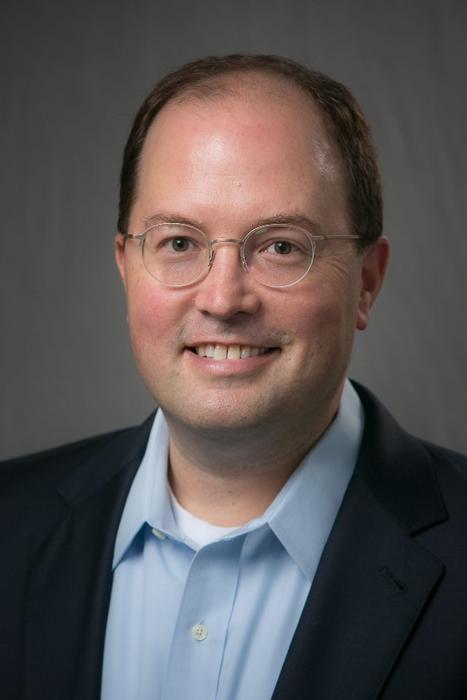The U.S. National Science Foundation (NSF) has awarded $26 million to establish a new Gen-4 Engineering Research Center (ERC) named Environmentally Applied Refrigerant Technology Hub (EARTH) to create a sustainable and circular refrigerant economy.

Credit: Lehigh University
The U.S. National Science Foundation (NSF) has awarded $26 million to establish a new Gen-4 Engineering Research Center (ERC) named Environmentally Applied Refrigerant Technology Hub (EARTH) to create a sustainable and circular refrigerant economy.
The University of Kansas is the lead institution, joined by partners at Lehigh University, University of Notre Dame, University of Maryland, University of Hawai’i and University of South Dakota. David Vicic, the Howard S. Bunn Distinguished Professor of Chemistry, will lead Lehigh’s team. Mark Shiflett, University of Kansas Foundation Distinguished Professor in the Department of Chemical & Petroleum Engineering, will be the ERC EARTH director.
At the heart of ERC EARTH’s work is reimagining the process for heating, ventilation, air-conditioning and refrigeration (HVACR) systems across the globe. EARTH will develop sustainable, accessible and equitable refrigerant technologies and practices through research, education and innovation that will improve quality of life and combat climate change.
“The EARTH Center will allow participating Lehigh faculty, students and staff to closely interact with the other core institutions to generate new scientific knowledge, engineering and chemical products, environmental policy recommendations, and industry and stakeholder behavioral changes to stimulate HVACR-ecosystem transformations,” Vicic said. “Commercial leaders will also be engaged with EARTH through direct involvement of projects, testbed use, membership programs, training activities and participation at EARTH’s annual meetings, which will allow graduate and undergraduate students to gain unique relationships with industry.”
The open-source educational material that EARTH provides will also benefit HVACR programs at smaller partnering institutions like Pennsylvania College of Technology by updating and refining curricula in a way that would not be possible otherwise.
The interdisciplinary team at Lehigh involves professors Vicic (synthetic chemistry), Lisa Fredin (computational chemistry), Elizabeth Young (molecular spectroscopy), Jessecae Marsh (cognitive psychology) and Todd Watkins (innovation economics and technical entrepreneurship). Watkins will serve as co-lead of the ERC EARTH Innovation Ecosystem group.
ERC EARTH’s multifaceted approach addresses a critical challenge
HVACR systems are widespread throughout society, enabling transportation and preservation of fresh foods, storage of medicines and cooling of buildings. Most current refrigerants are hydrofluorocarbons (HFCs), which have high global-warming potential. As a result of leaks from existing systems and the energy required to operate them, HFCs account for nearly 8% of global greenhouse-gas emissions.
In response, the U.S. and 170 other countries are phasing down HFCs in accordance with domestic and international agreements signed in recent years, which creates a tremendous challenge to responsibly and sustainably replace billions of kilograms of refrigerants.
Working closely with industry partners, EARTH will have the resources and expertise to solve the technical, environmental and economic challenges required to create a sustainable refrigerant lifecycle that will benefit the nation and the world.
“Multidisciplinary research teams will focus on three key areas: promoting the recycling and repurposing of refrigerants, developing transformative refrigerants and creating next-generation cooling and heating technologies with higher energy efficiency,” said Shiflett, who is director of University of Kansas’ Wonderful Institute for Sustainable Engineering.
Lehigh’s team will focus on developing solutions to deal with the reclamation and repurposing of high-global warming potential (GWP) legacy refrigerants. These solutions are needed to prevent millions of metric tons of high-GWP refrigerants from leaking and illegally venting into the atmosphere. Approaches will include new security markers for refrigerant producers to use at ports of entry and regional/local distribution centers; low-cost, energy-efficient separations of individual HFC compounds from recycled mixtures, waste refrigerants and future hydrofluoroolefin blends; and new methodologies for repurposing high-GWP refrigerants into diversified fine and commodity chemicals.
Lehigh’s Chemistry Department has world-renowned expertise in manipulating refrigerant-like molecules, which made it a top choice for leading these studies.
Behavioral data and analyses to improve new technology adoption, foster business model innovation, and identify social, behavioral and business barriers to transitioning to new refrigerants – together with economic analyses that influence future policy making – will support EARTH’s research and will be led by Lehigh researchers.
Building an ongoing innovation ecosystem
The Center’s interacting foundational components go beyond the research project, including engineering workforce development and value creation within an innovation ecosystem that will outlast the lifetime of the ERC.
The Lehigh team, through the Martindale Center for the Study of Private Enterprise, is co-leading those ERC EARTH innovation ecosystem efforts, aimed at accelerating the uptake of new ideas emerging from EARTH research.
“EARTH aims to advance promising technologies by connecting innovators to entrepreneurship and industry resources and partners to tackle key HVACR innovation, entrepreneurship and scale-up challenges by leveraging deep supporting infrastructures across all six partner universities, in order to foster innovation and entrepreneurial mindsets throughout the HVACR research and education ecosystem,” said Watkins, who is executive director of the Martindale Center in the College of Business.
In addition, EARTH’s operational design will cultivate inclusive, interdisciplinary research collaborations and foster workforce development, Shiflett said. This includes partnering of the EARTH team with community colleges and technical schools to ensure availability of the needed workforce at all levels.
The NSF’s Engineering Research Centers bring universities and businesses together to strengthen the competitive position of American industry in the global marketplace.
“NSF’s Engineering Research Centers ask big questions in order to catalyze solutions with far-reaching impacts,” NSF Director Sethuraman Panchanathan said. “NSF Engineering Research Centers are powerhouses of discovery and innovation, bringing America’s great engineering minds to bear on our toughest challenges. By collaborating with industry and training the workforce of the future, ERCs create an innovation ecosystem that can accelerate engineering innovations, producing tremendous economic and societal benefits for the nation.”
ERC EARTH was selected from among hundreds of proposed centers nationwide. The NSF project is renewable after five years for another $26 million dollars, for a potential effort of 10 years and $52 million.



